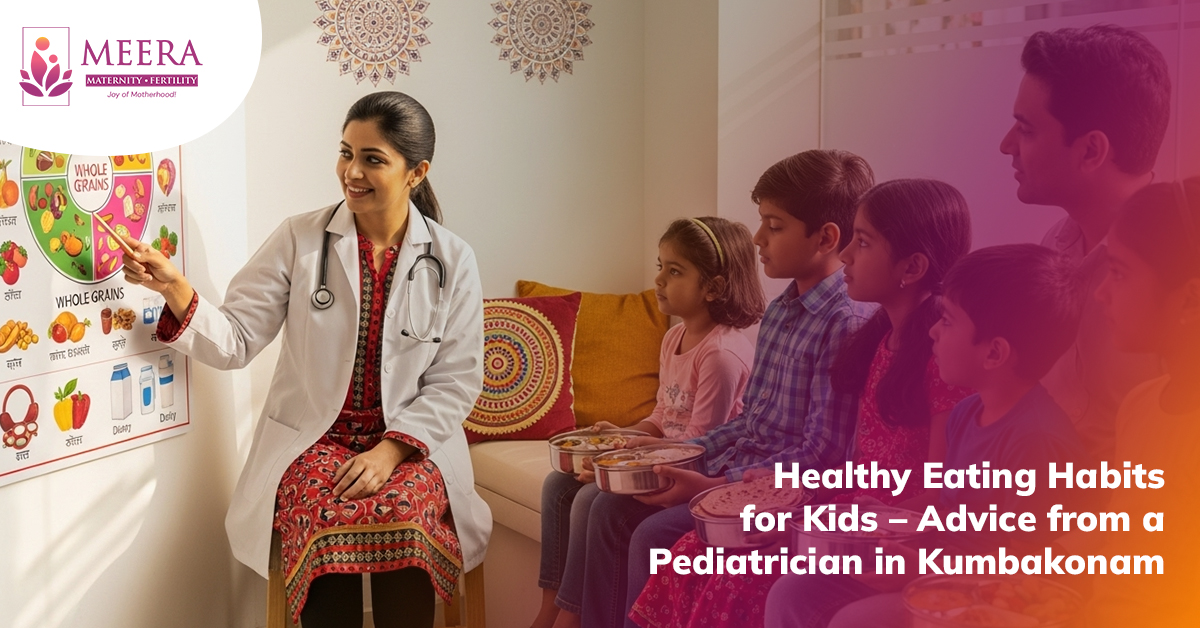Good nutrition during childhood lays the foundation for a lifetime of health and wellness. In today’s world of processed snacks and sugary temptations, it’s becoming increasingly challenging for parents to ensure their children eat right. According to the experienced team at Pediatrician in Kumbakonam from Meera Maternity, building healthy eating habits early helps prevent nutritional deficiencies, supports proper growth, and strengthens immunity—all of which are crucial for developing minds and bodies.
This guide offers practical child nutrition tips and explores how you can encourage better eating habits for your little ones, based on expert pediatric insights from Meera Maternity.
1. The Foundation of Healthy Eating Starts Earl
Children form their eating preferences at a very young age. Introducing healthy foods early and consistently is key to developing positive associations with nutritious meals. Meera Maternity’s pediatric team advises parents to include a mix of colorful fruits, vegetables, proteins, and whole grains in every meal.
Even during infancy, offering small portions of mashed vegetables or fruits helps children adapt to natural flavors rather than overly sweet or salty foods. When these habits begin early, they often continue into later childhood and adulthood.
2. Balanced Diet: The Key to Growth and Immunity
A child’s body needs a variety of nutrients every day to function properly. A balanced diet should include carbohydrates for energy, proteins for muscle development, and vitamins and minerals for immunity and cognitive growth.
Parents can refer to these simple food group guidelines for a balanced plate:
- Fruits and Vegetables (50%) – Provide fiber, antioxidants, and essential vitamins.
- Proteins (25%) – Include lean meats, eggs, lentils, and dairy products for tissue building.
- Whole Grains (25%) – Offer sustained energy through brown rice, millets, or whole wheat.
The food habits that support child growth often rely on variety and moderation. Avoid overemphasizing one food type—diversity is key to a complete nutritional intake.
3. Healthy Snacking: Smart Choices for Active Kids
Children are naturally energetic, and that energy needs to be replenished regularly. However, not all snacks are healthy. Instead of processed chips or sugary biscuits, parents can choose:
- Fruit slices or smoothies
- Roasted nuts or seeds (for older children)
- Homemade trail mix
- Whole-grain sandwiches or parathas
- Boiled corn or sprouts
These options are not only filling but also nutrient-rich, providing steady energy without the sugar crashes associated with packaged snacks.
Encouraging mindful snacking helps prevent overeating and maintains balanced energy levels throughout the day.
4. Hydration: The Overlooked Element of Nutrition
Water is one of the most underrated aspects of child nutrition. Kids often prefer juices or sodas, which may contribute to excessive sugar intake. Pediatricians recommend plain water as the best form of hydration.
For variety, parents can introduce natural alternatives such as:
- Tender coconut water
- Lemon water with a pinch of salt
- Buttermilk or diluted curd drinks
These provide essential electrolytes and keep children refreshed, especially in the summer months.
5. Dealing with Picky Eaters
Almost every parent faces this challenge at some point—getting kids to eat what’s good for them! Instead of forcing food, try these strategies:
- Involve your child in meal preparation to spark curiosity.
- Offer healthy dips or sauces with veggies.
- Present food in fun shapes or colors.
- Maintain a calm environment during meals—avoid distractions like TV or gadgets.
Pediatric experts at Meera Maternity emphasize patience. It may take multiple attempts for a child to accept a new food, but consistent exposure usually works.
6. Building Positive Mealtime Habits
Creating a consistent mealtime routine encourages structure and discipline. Sit together as a family whenever possible—it helps children associate food with social bonding and comfort.
Here are a few tips from Meera Maternity’s child nutrition tips:
- Set fixed meal and snack times.
- Avoid using food as a reward or punishment.
- Encourage children to listen to their hunger cues.
- Keep portion sizes age-appropriate.
These habits promote a healthy relationship with food and reduce the risk of overeating later in life.
7. The Role of Parents in Setting an Example
Children learn best through imitation. If they see parents enjoying fruits, vegetables, and home-cooked meals, they are more likely to follow suit. Creating a positive atmosphere around food—without labeling items as “good” or “bad”—helps instill a balanced mindset about eating.
Parents should also focus on moderation rather than restriction. A small treat occasionally is acceptable when balanced with nutritious meals most of the time.
8. The Link Between Nutrition and Learning
Healthy food doesn’t just support physical growth—it directly affects concentration, mood, and academic performance. Nutrients like omega-3 fatty acids, iron, and vitamin B12 play a critical role in brain development.
Studies show that children who eat balanced meals are more alert, focused, and perform better in school. Skipping breakfast or consuming too much junk food can lead to fatigue, irritability, and decreased attention spans.
For this reason, Meera Maternity’s pediatric care emphasizes the importance of regular dietary assessments as part of overall child development monitoring.
9. When to Seek Professional Guidance
If a child exhibits issues like frequent fatigue, poor appetite, slow growth, or digestive discomfort, it may be time to consult a pediatric specialist.
At Meera Maternity, expert pediatricians conduct thorough assessments to identify possible nutritional deficiencies or intolerances. Tailored meal plans, supplement recommendations, and lifestyle advice are provided to help each child thrive.
For more insights on holistic pediatric care and nutrition support, visit the Pediatrician in Kumbakonam page at Meera Maternity.
10. Final Thoughts: Building Lifelong Healthy Habits
Healthy eating is not just a phase—it’s a lifestyle choice that must be nurtured from the very beginning. With the right guidance and consistent practices, parents can help their children grow stronger, smarter, and happier.
The pediatric experts at Meera Maternity Hospital in Kumbakonam are dedicated to providing families with reliable, evidence-based nutrition advice. By fostering food habits that support child growth, you’re investing in your child’s brighter and healthier future.
